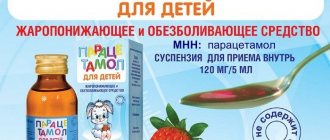Causes
Many diseases of the gastrointestinal tract, as well as their side effects, can cause fever due to constipation.
An increase in body temperature in an adult during constipation can be caused by:
- Intestinal obstruction . Feces stop moving through the intestines, causing severe abdominal pain, nausea and even vomiting, as well as an increase in temperature to 38˚C.
- Appendicitis . If, during inflammation of the appendix, the temperature rises above 37 ° C, then such a symptom may indicate possible peritonitis; there will also be pain in the right side of the abdomen.
- Intoxication of the body with accumulated feces and their decay products. The temperature in this case can usually rise to 37 ˚С 37.5 ˚С. Other symptoms of toxin poisoning will also be observed: weakness, bloating, headache, refusal to eat and weight loss.
- Paraproctitis . Inflammation of the tissues in the rectal area leads to a serious illness with a rise in temperature to 37.5 ° C to 38 ° C.
- Exacerbation of hemorrhoids . Feces pass through the intestines and, touching the nodes, cause pain and inflammation, which will cause fever.
- Diverticulitis . The formation of an extra part of the intestine leads to the accumulation of feces, toxins, gases and other waste, which begin to cause a local inflammatory process, leading to constipation, and sometimes fever and chills.
- Intestinal tuberculosis . Damage to the intestines by such a disease can cause constipation, the feces are hard and mixed with blood, and the temperature rises up to 39 ° C.
- Dysbacteriosis . Here, the high temperature is caused not by the microflora disorder itself, but by what caused it. When treating constipation, people often use strong laxatives, which will expel the stool and the beneficial bacteria along with it. The body suffers from such a malfunction and can react to it with heat.
Stomach upset, indigestion, and other problems with the process of digesting food can also lead to short-term constipation and a rise in temperature to a low-grade level.
- Hormonal imbalances in the body . Here the intestines will become a victim, and the temperature will be a side symptom not of constipation itself, but of the primary disease.
- Parasitization of worms in the intestines . Their tangles lead to persistent constipation with rapid weight loss with good nutrition. The body reacts to worms as an allergen and tries to remove it, which is sometimes accompanied by a not very high temperature.
- Intestinal diseases . IBS, ulcers, colitis and other diseases can contribute not only to constipation, but also cause an increase in a person’s body temperature.
To find out why your temperature has risen due to constipation, you need to contact a specialist; only he will be able to determine the true cause.
https://youtu.be/MKmYx4Z4hdI
Pathologies associated with fever and difficulty defecating
Constipation and fever are often manifestations of diseases such as:
- Appendicitis. With acutely developing inflammation of the appendix, a temperature of 38 degrees or higher is not uncommon; this is due to the release of toxins from the pathological focus. Constipation with appendicitis develops less frequently than diarrhea, but it may well occur in both adults and children.
- Viral infection. Infection with pathogenic microorganisms leads to activation of the immune system, while hyperthermia allows the destruction of microbes. The highest peak in temperature rise occurs during viral infection in the first two to three days of illness, then it gradually normalizes. Constipation with respiratory infections does not develop immediately, but as a consequence of dehydration and sometimes due to taking a number of medications.
- Cholecystitis, pancreatitis, gastritis. The temperature in these diseases can last for several days during the period of exacerbation of pathologies. Constipation is caused by errors in nutrition and deterioration in the functioning of the gastrointestinal tract.
- Intestinal obstruction. The disease occurs due to blockage or compression of the intestines. This leads to a pronounced inflammatory process, which occurs with high fever, general intoxication, severe cramps and abdominal pain. Constipation can be either complete or partial, that is, stool is released in a small volume.
- Dysbacteriosis. Changes in the microflora of the digestive organs negatively affect the digestion of food and the functioning of the large intestine, which becomes the cause of constipation. Dysbacteriosis also affects the reduction of the protective barriers of the immune system, so the temperature can increase even with minor inflammation.
- Diverticulosis of the large intestine. This disease is a common cause of constipation in adults. The pathology is characterized by the formation of sac-like protrusions in the walls of the organ, which is facilitated by age-related changes in the connective tissue and frequent overstretching of the organ. Diverticulosis is manifested by pain, constipation and periodic hyperthermia.
In addition to the listed diseases, high fever and constipation are often manifestations of helminthiases, food allergies, and irritable bowel syndrome. All pathologies are manifested not only by constipation and hyperthermia; an accurate diagnosis is made only after a complete diagnosis.
Symptoms
Constipation and fever are not the only symptoms that occur during intestinal diseases.
All of the above causes have secondary symptoms that can help the doctor make a diagnosis.
These include:
- a person has a stomach ache;
- bloating and flatulence are noted;
- There is weight loss, both due to loss of appetite and when the patient eats normally;
- nausea, possibly vomiting;
- decrease in hemoglobin, up to the appearance of anemia;
- constipation itself, stool retention for more than three days, or a decrease in the amount of feces down to a minuscule amount;
- pain during bowel movements;
- the presence of impurities in feces;
- weakness and malaise;
- problems with skin and hair appear.
Drug treatment
Medical experts recommend self-administration (without prior consultation) of oral laxative medications only in emergency cases (for example, in case of sudden, one-time constipation). Among the most common and popular drugs (which are produced both in tablet form and in the form of syrup) are Senade, Laxacodil, Duphalac, Bisacodyl, Fitolax.
Important! Almost all remedies for constipation have medical contraindications, so before using them you should carefully read the instructions.
Anal medications to normalize bowel movements act only on dense feces accumulated in the rectum and do not in any way affect the organs of the digestive system located above. Therefore, they are most suitable for independent use. A very convenient, fast-acting and very effective remedy for constipation is the disposable microenema "Microlax". Although, if a pharmacy is temporarily unavailable (for example, at a dacha or on a camping trip), it can be successfully replaced with a regular syringe with warm water.
Another popular way to get rid of constipation (in both adults and children) are rectal suppositories made on the basis of glycerin (which has a gentle effect on the mucous membrane, stimulates the functioning of the rectum and is practically not absorbed by the body).
Fever in children with constipation
Constipation and high fever are most often observed in children under 3 years of age. This is due to changes in diet, introduction of complementary foods, and transfer of the baby to a new formula.
A baby's intestines are not adapted to digesting any food, especially artificial mixtures. Therefore, at first, constipation may occur; most often it goes away without complications, but sometimes it can cause fever, refusal to eat, tearfulness and abdominal pain.
If such symptoms are present, the mother should show the baby to the pediatrician. The doctor may advise changing the formula for feeding or, if the mother is breastfeeding, prescribing an appropriate diet for her. When the child turns 2 years old, constipation and fever quickly subside, since by this time the body has time to fully adapt to the new food, and the immune system is also strengthened.
Nutritional Features
Diet for constipation with fever is an important condition for successful treatment. Meals should be small and moderate. Food is boiled or steamed. Exclude from the diet:
- confectionery;
- salty snacks;
- alcoholic drinks;
- canned food;
- marinades;
- fat;
- roast.
It is very important to give up everything fried, fatty and salty.
Nutrition should be balanced and contain the maximum amount of healthy vitamins and microelements. You cannot drink coffee or strong teas. Otherwise, the condition will worsen. The diet should contain low-fat fermented milk products.
The patient needs to maintain a drinking regime. You should drink a glass of water every morning.
Constipation in pregnant women
When the pregnancy is already three months or even more, the fetus becomes large and begins to put pressure on the intestines, blocking the passage of feces.
Women in this position often suffer from constipation, but an increase in temperature above 37 should alert them and become a reason to see a doctor.
This symptom may be a sign of a developing gastrointestinal pathology, so you should not delay going to the doctor and self-medicate, much less take antipyretics without knowing the cause.
Therapy methods
Treatment is carried out using medications. Traditional medicine recipes are also effective. The main thing is to identify the exact cause of negative changes before starting therapy.
Medications
Treatment should be started without delay. Medicines are selected by the doctor after making an accurate diagnosis.
The following laxatives are prescribed:
Duphalac helps soften feces and restore microflora. The medication is used for dysbacteriosis. Contraindicated in case of individual intolerance to the components of the product.
Guttalax is prescribed to children over four years of age and adults. The drug is not adsorbed and is contraindicated in case of dehydration.
Microlax is a microenema. Used when it is impossible to determine the cause of the temperature increase. Positive changes are observed a quarter of an hour after administration of the medicine.
Phytolax consists of natural ingredients. Not for use in case of individual intolerance to the constituent substances. Allowed when treating children.
In order to normalize body temperature, antipyretics are prescribed (Paracetamol, Ibuprofen, Nurofen).
Folk remedies
Traditional medicine recipes are effective in normalizing stool and are safe. The risk of allergies is minimal.
The most commonly used means are:
- A mixture of cucumber, beetroot and carrot juice. Products are taken in a ratio of 1:1:3. Drink the prepared liquid before meals. The dosage is 100 ml. You can drink the product in small portions throughout the day.
- A drink based on apple juice and beetroot. The products are mixed in a 2:1 ratio. A glass of cocktail is drunk on an empty stomach before breakfast.
- Cucumber pickle. One and a half glasses of liquid should be drunk on an empty stomach.
- Flaxseed infusion: 1 tsp. raw materials are poured with a glass of boiling water, the liquid is infused for about half an hour. Take the drug orally before meals, 50 ml.
Temperature after constipation has passed
When constipation is eliminated, but the temperature remains or even begins to increase even more, this is a clear sign of pathology of the digestive organs. Gastritis, pancreatitis, cholecystitis, colitis, enterocolitis, and peptic ulcers may subside temporarily, helping to normalize stool, but the temperature will still persistently remind the person that the problem is not solved and there is no need to rejoice at the imaginary relief.
In this case, you need to visit a doctor and find the cause of this phenomenon. After defecation, which finally happened for the first time in a long time, the temperature may temporarily rise due to the accumulation of toxins and poisoning of the body with them, after a while this will pass.
When to see a doctor
You should know in what situations self-medication is unacceptable.
Urgent medical attention is needed if the following symptoms appear:
- feces become black (such changes indicate internal bleeding);
- frequent vomiting;
- pronounced pain syndrome;
- a sharp decrease in blood pressure;
- heart rhythm disturbance;
- breathing problems, shortness of breath;
- excessive sweating;
- paleness, cyanosis of the skin.
Ignoring such symptoms entails irreversible consequences, including death.
It is important that medical care is provided in a timely manner . Such problems are especially dangerous for children, pregnant women, and the elderly. For them, any infection can be fatal.
Hyperthermia during constipation cannot be ignored. It is necessary to immediately identify the cause of such changes and begin treatment. In this case, the patient's condition quickly improves, and the temperature returns to normal.
An elevated temperature that occurs when defecation is difficult can be a signal of pathological processes in the body. An accurate diagnosis and clarification of the reasons that led to such symptoms largely determine the success of treatment. The main factors that cause such conditions, as well as whether the temperature can rise from constipation - all relevant information is in our article.











